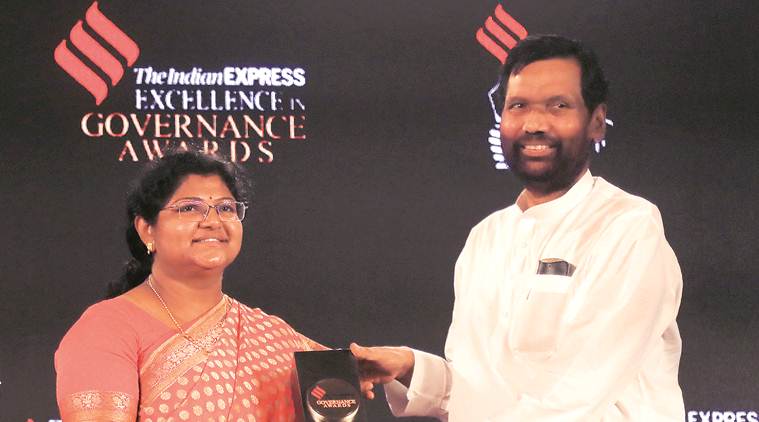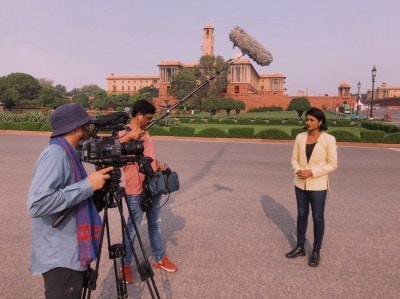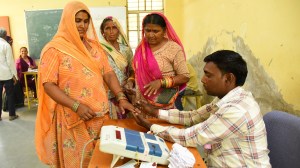- India
- International
With open doors and strict gates, a scheme secures Maharashtra ashram schools against sexual exploitation
This tightly controlled system of checks is part of a regimen called Jivhala (affection), including awareness and sensitisation programmes, brought in across Maharashtra ashram schools after several reported incidents of sexual exploitation of girls.
 Nagpur Additional Tribal Commissioner Madhavi Khode Chaware receives the award from Union minister Ram Vilas Paswan
Nagpur Additional Tribal Commissioner Madhavi Khode Chaware receives the award from Union minister Ram Vilas Paswan
At the Borda government ashram school for girls, located in the Tadoba-Andhari Tiger Reserve’s buffer zone, about 30 km from Maharashtra’s Chandrapur city, nobody, even a VIP, is allowed in without making an entry in a register maintained by a security guard.
This tightly controlled system of checks is part of a regimen called Jivhala (affection), including awareness and sensitisation programmes, brought in across Maharashtra ashram schools after several reported incidents of sexual exploitation of girls.
The need for the programme was felt following the uproar over a 2016 incident of sexual abuse of a 10-year-old girl at an ashram school in Wardha district, allegedly by a worker employed for construction work at the school.
Additional Tribal Commissioner of Nagpur Madhavi Khode Chaware, who worked out the Jivhala regimen, was one of the recipients of The Indian Express Excellence in Governance Awards, under the category ‘Child Development’.
Read | Garbage dump to Nature Park in two years, a Kullu success story
Recently, an ad-hoc committee of state women legislators against sexual exploitation recommended Jivhala as a possible solution. Khode, now Commissioner (Textiles) at Nagpur, said, “Sexual abuse in ashram schools is underreported, like malnutrition. Children get enrolled here at the age of six and, as such, get no learning about such things from their parents… After we rolled out Jivhala, providing training and orientation to all stakeholders, as also video and reading material, children now speak out openly about these intimate issues. The thought behind it is two-fold — empowering children and sensitising the school administration on its responsibilities.”

While teachers and students were given training on do’s and dont’s, covering everything from vulgar gestures and exhibitionism to porn, students were counselled about the physical changes happening in their body and good and bad touches, through CDs etc, and a code of conduct put in place for everyone from contractual workers to donors, volunteers, trustees and visiting government officials. Every staffer or volunteer can now only be employed after a background check.
Under a ‘Balsakha’ and ‘Balsakhi’ system, students from Classes 8 to 10, to be trained annually, were appointed to act as a bridge between the children and administration. A ‘Samvad Peti’ (communication box) was put up in schools to allow students to share their grievances anonymously, while a 30-minute weekly Samvad Varga (communication class) was started for interactive sessions with students, reiterating the whole concept.
Also read | How technology linked far-flung Andhra Pradesh’s villages to each other
The responsibility for ensuring child security has been vested with school management committees, which comprise members of village child rights committees, female and male wardens, and Balsakhas and Balsakhis.
Apart from CDs explaining how sexual predators lure children, and booklets showing what children feel about how they get treated by elders, the schools share with students pamphlets explaining what the United Nations charter says about children rights, what India has done to fulfill that promise, and the Acts that ensure these rights. The new set of rules requires schools to take parents’ permission to take students out for any assignment or reason, and to inform the District Project Officer, Tribal Department, followed by the registration of an FIR, within the hour in case of any incident.
Chaware said, “The challenge was opening up the topic itself. The word ‘sexual harassment’ is difficult to teach to children. Even officials had problems.” The award, she hoped, would open up conversations regarding the issue.
Apr 23: Latest News
- 01
- 02
- 03
- 04
- 05






































